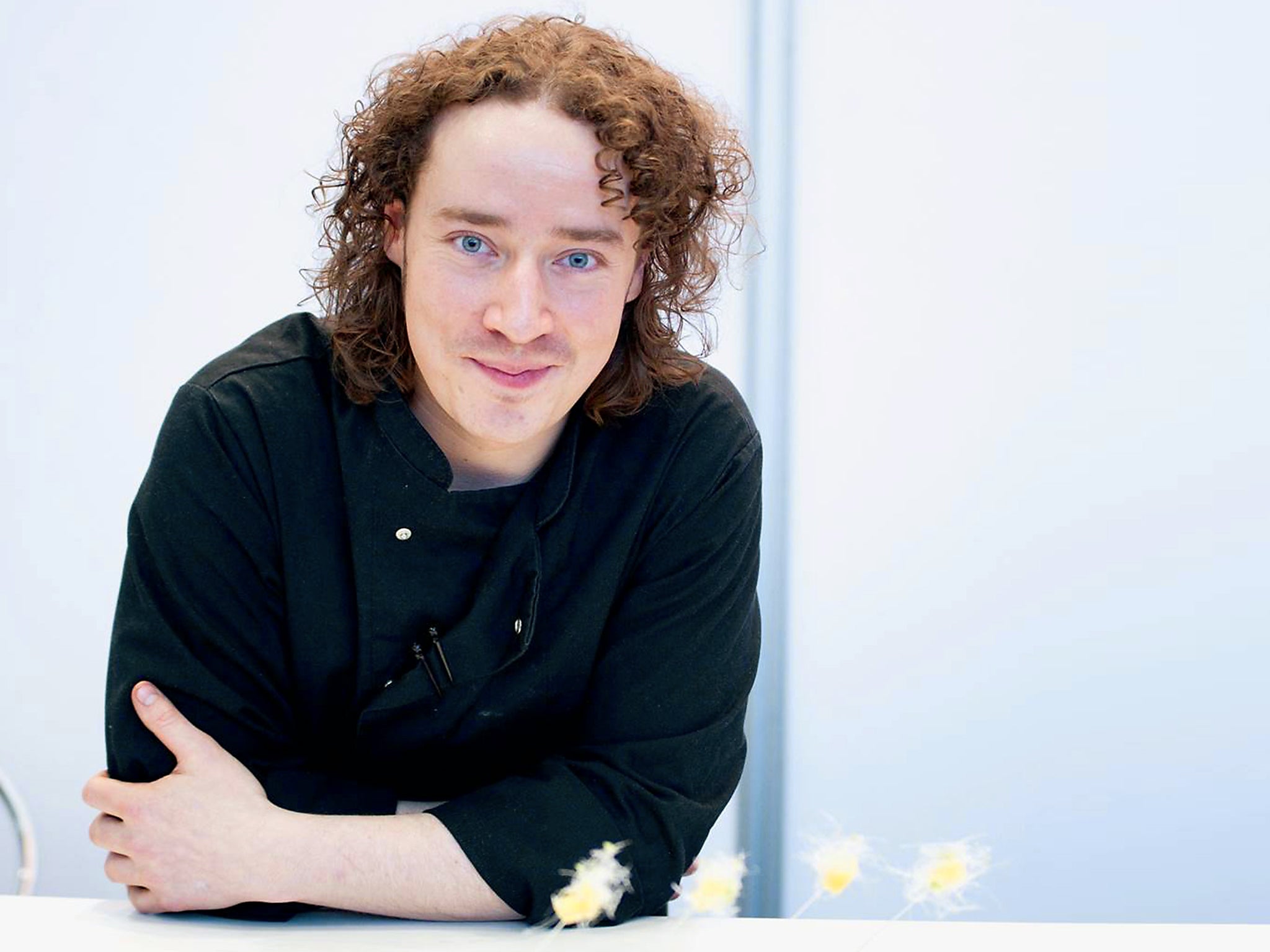The Independent's journalism is supported by our readers. When you purchase through links on our site, we may earn commission.
Meat Free May: Chef Eddie Shepherd says there is more to going veggie than chips, cheese and bread
With Friends of the Earth’s annual diet shake-up under way, this chef says taking a break from lamb chops and steak can still mean killer dishes

What was your initial inspiration in becoming a chef?
Like most chefs I think I was really captured by a love of cooking and the buzz of being in a busy restaurant kitchen. I was already working in restaurants to pay my way through university and when I graduated I was already hooked and it was all I wanted to do.
What kind of food culture were you surrounded by growing up?
My parents always made sure we ate well and tried different foods. We had mostly homemade meals and never really had fast food or sugary snacks, so we had a really healthy varied diet. My parents weren’t vegetarian and I didn’t go vegetarian until I was older so that side only came later.
Is it difficult specialising as a vegetarian chef?
It was hard at first because I really wanted to learn to be as good as possible and there were just fewer places I could go to do that. So I started out in restaurants that served meat and fish and later I was able to specialise more and progress more on my own once I had a really good grounding in cooking and techniques.
What made you want to write cookbooks?
I always loved cookbooks, I have a ridiculous cookbook collection on display in our dining room and I love looking through them. I wanted to try creating something of my own so I made a digital cookbook including video and lots of images and it was really popular so I have since done a few more. My next big project is trying to create a proper printed book which has always been one of my ambitions.
When did you become vegetarian and why?
I went vegetarian when I was at university and studying for my philosophy degree. I hadn't felt comfortable with some issues around eating meat for a while and so I decided to just it out for a while and it really seemed to stick and work well for me.
Do you try and convert others into a meat-free diet?
No, not at all. I think everyone should make their own decisions and I wouldn't feel comfortable trying to persuade anyone to change their diet, and I wouldn’t want anyone doing that to me. I do try and promote and showcase high-quality vegetarian cooking though and I’m trying to raise the level that vegetarian food can aspire to.
Do you think Manchester does a good job at catering to vegetarian diets?
Yeah it’s great for vegetarians and vegans. In particular you have Simon Rimmer’s vegetarian restaurant, Greens in Didsbury which is great and somewhere I have fond memories of working when I first moved back to Manchester. Then for more casual, cafe food there’s [the co-operative] Eighth Day Cafe near the city centre. And Unicorn Grocery in Chorlton is a fantastic resource.
Do you celebrate National Vegetarian Week?
I don’t have anything planned this year but in previous years I have been involved in a few things, sometimes doing cooking demonstrations or judging competitions.
Do you think vegetarian food gets a poor reputation?
I think it used to have a poor reputation but that has improved now. People used to associate it with boring food, but I hope that is less true now as people have just been more exposed to good, interesting vegetarian cooking, and now that there are more and more people doing exciting things with it.
What are your go-to ingredients for cooking at home?
I always have salt, tamari, kombu seaweed, tofu, a well-stocked spice cupboard, strong bread flour, nice olive oil, varying fresh vegetables, chillies, lemons, frozen berries – they are pretty essential to me. But it really depends on what I want to cook. I’ll go to a shop most days to pick something up for that night.
Do you have any chefs you admire or draw inspiration from?
Yes, in particular Grant Achatz from Chicago is a big inspiration and totally changed the way I look at food. His food looked so different and artistic which really reframed what was possible with food for me.
Do you have any tips for people who want to change to a meat-free diet?
Cook for yourself from fresh ingredients as much as possible is the main thing. And try to make sure your diet stays varied, don't rely too much on carbohydrates like bread and potato as it can be easy to end up eating loads of them.
What kind of protein do you like to use in place of meat and what else can people use instead of tofu?
I don’t think of it as using something in the place of meat, but it is important to me to include protein in dishes. I often use tofu as it is a fantastic and versatile ingredient with a rich history and tradition. A skilled cook can really do some fantastic things with tofu. But I will also use cheeses: halloumi is always a great option. And of course pulses are a good source of protein too.
Would you ever compromise aesthetics for taste?
I definitely think food should look good too but flavour is the most important thing. I always try to make something delicious first then figure out how I want to present it afterwards. With some effort I think you can make any delicious food look beautiful too.

Would you ever think to transition into veganism in the future?
I’m not currently planning to, but I have certainly noticed a big rise in the number of requests I get for vegan meals and it is a movement that has grown hugely over the past five years.
Do you use organic produce on your menu and do you think it makes a difference?
I use it where it makes sense or is possible but I’m not strict about it. The most important thing to me is to use the best products possible, and that is not always the same as organic. However all the tofu and eggs I use are organic and the eggs I use are too, because I understand free-range organic eggs to be the most ethical option with the best treatment of the animals.
What do you consider unhealthy vegetarianism?
It would be possible to be vegetarian but just live off chips, cheese and bread, so it is important to make sure you are getting a varied diet. Being vegetarian on its own isn’t necessarily a healthy lifestyle unless you make good food decisions too. I also think sometimes people think if they get vegan cakes etc they are somehow healthier so it’s fine to have them more often, which is not true at all. They might be made with different fats and sugars but vegan cakes and desserts are still full of fats and sugar so like anything they should only be part of a varied and balanced diet.
What kind of attitude, if any, do you find people to have towards you being a vegetarian chef?
I always get a really positive reaction from both chefs and the public. People seem interested and usually people can see from the food that I’m really passionate about what I do and a lot of work goes into it to make it as good as possible.
What was your motivation behind your The Walled Gardens Supper Club?
I wanted somewhere to serve my food in a tasting-menu format (I do 13 courses a night) that was intimate and where I had no real restraints on the creative possibilities for the meal. I serve dishes with elements set on fire; I have things hung from the ceiling, dry ice, things served suspended in glass straws. The only limit to what I can do here is if I think something is delicious enough and I can pull it off to a really high quality night after night.
What advice can you offer to aspiring vegetarian chefs?
Get into the best restaurant kitchen that will have you and work hard. It’ll take a few years to really start to make progress but you have to lay the groundwork by learning as much as you can in a real professional kitchen environment. It will pay off hugely in the future if you can stick it out and pay your dues in busy kitchens for a few years.
Join our commenting forum
Join thought-provoking conversations, follow other Independent readers and see their replies
Comments
Bookmark popover
Removed from bookmarks